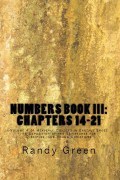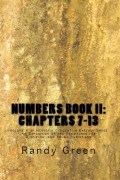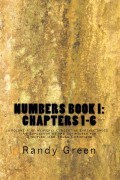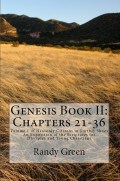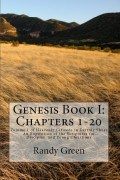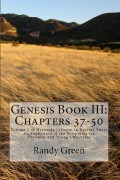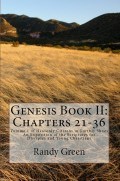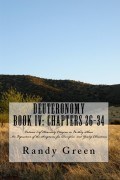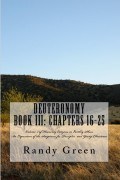Randy Green's Blog, page 364
August 16, 2015
An Army of Phinehases – Part 3
NEWS FLASH!!! Acts: Volume 8 of Heavenly Citizens in Earthly Shoes is now available from CreateSpace (paperbacks) and Kindle (eBooks). Click on the link to the right of this page to go to Amazon and place your order.
Then the Lord spoke to Moses, saying, “ Phinehas the son of Eleazar, the son of Aaron the priest, has turned away My wrath from the sons of Israel in that he was jealous with My jealousy among them, so that I did not destroy the sons of Israel in My jealousy. Therefore say, ‘Behold, I give him My covenant of peace…because he was jealous for his God and made atonement for the sons of Israel.’” [Numbers 25:10-12]
If only we puny humans would submit to the Holy Spirit, we would be Johnny #2 and simply come clean with our sins. Instead we have a doctorate in rationalizations. We are Johnny #1. We make excuses and wheedle in an effort to gain pity for ourselves.
In 1 Corinthians 11:31 the Apostle Paul explained to the troublesome Christians in the church of Corinth that, if they judged their own sins, the Lord wouldn’t have to judge them. This concept is quite apposite to the situation in Numbers 25, dear friends.
The Israelites were on the east bank of the Jordan River opposite Jericho. They were delivered from Egyptian slavery by the Lord their God. The Lord led them through the wilderness for forty years and brought them to the plains of Moab on the east bank. They were on the verge of crossing the Jordan to the west bank and receiving their landed inheritance, the Promised Land.
Well, the folks who lived on the west bank weren’t too keen on the thought of this happening. Neither were the folks on the east bank who attacked the Israelites and were exterminated in the doing. Israel now owned all their lands.
Israel’s neighbors on the east bank weren’t much enthused with the new tenants either. These neighbors included the Moabites and their partners the Midianites. So those two folks wanted to evict the Israelites, preferring them dead over expelled.
First they tried to arrange a military conquest of the Israelites. The first step in doing this was to hire a false prophet named Balaam to curse Israel. That way the Israelites would be too weak to stand their ground against the enemy coalition. But the Lord blessed Israel and repulsed Balaam’s attempts, forcing him instead to acknowledge the blessing of God upon Israel.
So Balaam concocted another scheme: if attacks from the outside failed, try attacks from the inside. Balaam directed the Midianites to bedeck their loveliest honeys in alluring attire. Then dispatch them to the camp of Israel to seduce the pubescent Israelite boys.
Once in the embrace of the Midianite babes, those boys would worship the Midianite gods without even knowing it. Then the Lord God of Israel would be furious and kill the Israelite men. What a plan! The Moabites and Midianites wouldn’t even have to kill the Israelites. Their own God would do the job for them!
Oh, dear. Outta time again! I can’t wait to find out how Balaam’s devilish machination came out. But we’ll have to…until tomorrow.
To further research this issue, I direct you to my book Numbers: Volume 4 of Heavenly Citizens in Earthly Shoes. To purchase my books please go to:
http://www.amazon.com/Randy-Green/e/B00507WC86
Filed under: Church Age Tagged: 1 Corinthians 11, Aaron, atonement, covenant, jealousy of God, judge, Moses, Numbers 25, peace, Phinehas, priest








August 15, 2015
An Army of Phinehases – Part 2
NEWS FLASH!!! Acts: Volume 8 of Heavenly Citizens in Earthly Shoes is now available from CreateSpace (paperbacks) and Kindle (eBooks). Click on the link to the right of this page to go to Amazon and place your order.
Then the Lord spoke to Moses, saying, “ Phinehas the son of Eleazar, the son of Aaron the priest, has turned away My wrath from the sons of Israel in that he was jealous with My jealousy among them, so that I did not destroy the sons of Israel in My jealousy. Therefore say, ‘Behold, I give him My covenant of peace…because he was jealous for his God and made atonement for the sons of Israel’” [Numbers 25:10-12]
Johnny boy was caught red-handed, his hand still in the cookie jar. Straightway he took the offensive, feigning contrition in an attempt to wring pity from Mom.
Yep. Been there, done that. You too, right? That’s me personally and that’s my kids too. It comes from the sin nature inside each of us. We won’t tolerate any outside right and wrong. What we feel inside is right for us, so it is right! Begone with morality then and let us be.
Now let’s hear the way the story should be played out—no doubt occasionally it actually does happen this way. Johnny is a real kid, so in this story he’s still on the step ladder with his hand in the cookie jar. Mom is a real mom, so she by happenstance makes her way into the kitchen at just the right moment to bust Johnny in the act of cookie-filching.
From the floor Johnny hangs his head in shame, unable to even look Mom in the face. This time more than a couple of tears drop from one eye. Too many to count pour out of both eyes. He tries to apologize, but his emotions run amuck and his cries are too copious to allow speech to flow smoothly. In broken words and sentences Johnny thinks and tries to say,
I’m sorry, Mommy. You told me to leave the cookies alone until after supper, but I didn’t obey you. All the love you show me, always being there when I need you. You never do me wrong. You help me make it in school and in life. I never have to worry about being rejected or deserted. You never give up on me, call it quits, and walk out.
And here I go and do the one thing you told me not to do. I have no excuse, Mommy. I did wrong. Will you please forgive me? I know I must be punished, but I need your forgiveness first. Please forgive me, Mommy.
I embellished Johnny’s lament a bit…no, quite a bit! I know it’s too adult for a preschooler. But to whatever extent the kid could reason about right and wrong, that is what he would say, if he was truly sorry for doing wrong and not just sorry because he got caught and had to pay the piper.
Time to call it a day. I’m going to meditate on what we’ve been taught today, as I sit at the feet of Jesus. See you tomorrow.
To further research this issue, I direct you to my book Numbers: Volume 4 of Heavenly Citizens in Earthly Shoes. To purchase my books please go to:
http://www.amazon.com/Randy-Green/e/B00507WC86
Filed under: Church Age Tagged: 1 Corinthians 11, Aaron, atonement, covenant, jealousy of God, judge, Moses, Numbers 25, peace, Phinehas, priest








August 14, 2015
An Army of Phinehases – Part 1
NEWS FLASH!!! Acts: Volume 8 of Heavenly Citizens in Earthly Shoes is now available from CreateSpace (paperbacks) and Kindle (eBooks). Click on the link to the right of this page to go to Amazon and place your order.
Then the Lord spoke to Moses, saying, “ Phinehas the son of Eleazar, the son of Aaron the priest, has turned away My wrath from the sons of Israel in that he was jealous with My jealousy among them, so that I did not destroy the sons of Israel in My jealousy. Therefore say, ‘Behold, I give him My covenant of peace…because he was jealous for his God and made atonement for the sons of Israel.’” [Numbers 25:10-13]
Have you ever read those words before? I’m not being sarcastic. Honest! Most Christians have yet to read the Bible. Oh, many read parts of the Bible—favorite verses, chapters on the Christmas story, Psalms and Proverbs. But read Genesis through Revelation, an entire Bible book at a time? Sadly, but not too many do so.
This is why I asked you whether you ever read the words of our text before. Well, it makes for a never you mind for our purpose today. Whether you did or didn’t, when you read them now, what questions pass through your mind…aside from the foreign names, that is? I’ll suggest a few for you.
How can a mere man turn away God’s wrath?
How can a mere man have God’s jealousy?
What is God’s jealousy anyway?
How can a holy God kill people in jealousy and still be holy?
How can a mere man make atonement for other men?
Hmm. Those are some stimulating inquiries. I bet we’re in for a smorgasbord of spiritual victuals today. I hear the dinner bell, so we mustn’t dawdle. Let’s wash our hands, recline at the table, and get to eating!
To help us get a handle on the issue involved, perhaps a story or two for illustration purposes will benefit us. We all know the one about the preschooler and the cookie jar, don’t we? It goes like this.
Mom walks into the kitchen and discovers little Johnny boy on the step ladder, his hand deep in the cookie jar which reclines atop the kitchen cabinet. Mom grabs Johnny off the ladder, before he is startled by her presence and winds up falling off. As she places him on the floor, Johnny looks up in her face wearing a whimper-like expression. A tear or two drops out of the corner of his eye as he whines, “I’m sorry, Mommy.”
Well, if we could play Johnny’s private thoughts on the TV screen at that moment, we’d be cut to the quick by his real mindset. He was sorry all right, but not because he disobeyed Mom by invading the domain of the cookie against her express instructions. No! We’d hear this:
I’m sorry, Mommy, that you came in when you did. If you’d only have been a few seconds slower, I’d have a handful of cookies out back, chowing down and having the time of my life! Why couldn’t you have just waited a few moments, Mommy? Why’d you have to go and spoil my life again? I never get to have any fun. Wish you’d chill and let me be for once.
We will continue the tale on the morrow. Let’s pause a while and spend time with the Lord now.
To further research this issue, I direct you to my book Numbers: Volume 4 of Heavenly Citizens in Earthly Shoes. To purchase my books please go to:
http://www.amazon.com/Randy-Green/e/B00507WC86
Filed under: Church Age Tagged: 1 Corinthians 11, Aaron, atonement, covenant, jealousy of God, judge, Moses, Numbers 25, peace, Phinehas, priest








August 13, 2015
Curtain of Eternity – Part 5
NEWS FLASH!!! Acts: Volume 8 of Heavenly Citizens in Earthly Shoes is now available from CreateSpace (paperbacks) and Kindle (eBooks). Click on the link to the right of this page to go to Amazon and place your order.
(God) who has saved us and called us with a holy calling, not according to our works, but according to His own purpose and grace which was granted us in Christ Jesus from all eternity, but now has been revealed by the appearing of our Savior Christ Jesus, who abolished death and brought life and immortality to light through the gospel [2 Timothy 1:9-10].
In order to fulfill the eternal plan of God, God needed to enter time as a creature of time. That was why the eternal Son of God at a point in time (circa 7 B.C.) willingly took upon human nature. This is known as the “incarnation”.
The Son of God’s human nature was not sinful human nature but sinless human nature. God originally created man sinless. Man acquired his sin nature by disobeying the Word of God in the garden. The virgin birth of Jesus was the means by which real human nature was acquired without sin.
We already descanted upon the cross and empty tomb. The eternal Son of God exists simultaneously as a creature of time and space and matter because at a point in time He became a creature of time. He became a man. He didn’t stop being the eternal Son of God. Rather, He became a man simultaneously with being the eternal Son of God. Jesus Christ is the God-man, two natures existing simultaneously in one Person.
The duality which exists between time and eternity is intimated by the Holy Spirit in our text. From God’s perspective my salvation and calling occurred in eternity, and He is the source. But such a concept is incomprehensible to me. Now that the Word of God reveals it to me, I know its veracity and believe it. But I believe it by faith, not by intellect.
This doesn’t mean I stop being intellectual and become a blind dote, gullible and swallowing any blather I hear. It means I know the Lord Jesus personally and have learned by experience as well as His Word that He is utterly trustworthy and never lies or makes mistakes. Consequently I know that what He teaches me about this duality is true, though I am incapable of understanding it because it is too deep for my intellect to fathom.
Having learned all of this spiritual truth today, I am strengthened in the inner man to love Jesus all the more and live His holy calling. “Why so?” you ask. Because I realize even more why He bothered to become a human being forevermore. I recognize more deeply how much He truly loves me because He did so.
His appearance in time so as to fulfill God’s plan of eternity was for my benefit, not His. He wants me to know His love for me, so He came into time in a manner I could comprehend. That is how God reveals Himself to me and to you and to every Christian.
Can you relate to the love of God for you personally? Does this not strum your heart strings and play a love song for God? If so, then the duality between time and eternity as we read it in 2 Timothy 1 has achieved its goal. Works for me. Hope so for you too.
To further research this issue, I direct you to my book Genesis: Volume 1 of Heavenly Citizens in Earthly Shoes. To purchase my books please go to:
http://www.amazon.com/Randy-Green/e/B00507WC86
Filed under: Church Age Tagged: 2 Timothy 1, eternal life, eternity, God-man, incarnation, love of God, newness of life, Romans 12, time








August 12, 2015
Curtain of Eternity – Part 4
NEWS FLASH!!! Acts: Volume 8 of Heavenly Citizens in Earthly Shoes is now available from CreateSpace (paperbacks) and Kindle (eBooks). Click on the link to the right of this page to go to Amazon and place your order.
(God) who has saved us and called us with a holy calling, not according to our works, but according to His own purpose and grace which was granted us in Christ Jesus from all eternity, but now has been revealed by the appearing of our Savior Christ Jesus, who abolished death and brought life and immortality to light through the gospel [2 Timothy 1:9-10].
Jesus saved us and called us with a holy calling. Hallelujah! This is spelled c-r-o-s-s and e-m-p-t-y–t-o-m-b.
The cross was where the penalty for my sins was paid, where I was saved from sin and death. The empty tomb demonstrated this to be true. Death could not hold Jesus because He had no sin, and death comes as the wages of sin. Having died bearing the sins of all mankind, Jesus rose out of death with the bill for all those sins marked “Paid in Full!” Now the new resurrection life of Jesus is available to whoever will receive it.
The cross paid the penalty for sins. This is salvation. We are “saved” from sin. The empty tomb extends the benefits of the cross to include “a holy calling”. We are saved from sin for the purpose of living a holy life. To live a holy life requires power and ability within us which is not corrupted by sin. That is the definition of a new, holy nature.
That completes our diagnosis of the context for the duality between time and eternity, as presented in 2 Timothy 1. In that context we are able to rightly grasp what the Holy Spirit reveals to us by this duality. So let’s begin by repeating the duality, so that we have it fresh on our minds:
which was granted us in Christ Jesus from all eternity
but now has been revealed by the appearing of our Savior Christ Jesus
The word in point #1, “which”, refers to God’s salvation and holy calling combined. Remember, God never merely saves anyone. He saves for a purpose, and His purpose is that every person he saves stop living for sin and thenceforth live in the power of the Holy Spirit according to the Word of God. That is the definition of “a holy calling”.
Ergo, the duality has to do with God’s salvation and calling as they are joined together in holy matrimony for all eternity, beginning from the moment a person is saved. God didn’t plan His salvation and calling of each Christian at the moment he was born, nor even at the instant he was conceived, neither from the first thought mom and dad had of conceiving a baby together.
No, indeed! God’s plan to save me and call me with a holy calling occurred in eternity, dear friends! And the same applies to His plan for you guys and gals too. Eternity isn’t dependent on time, you see. We puny creatures of time had no existence until we were conceived and then born, but God’s plan for us existed even before time began! Explain that one to me, I dare you!
Still, eternal plans for creatures of time and space and matter don’t go very far, unless time actually exists along with those creatures. This brings in point #2 of the duality we are vetting from 2 Timothy 1. In order to fulfill the eternal plan of God, God needed to enter time as a creature of time.
Hold that thought. It is much too steep for us to wander into it willy-nilly at this late hour. We will explore that terrain on the morrow. Enjoy time with the Lord Jesus now.
To further research this issue, I direct you to my book Genesis: Volume 1 of Heavenly Citizens in Earthly Shoes. To purchase my books please go to:
http://www.amazon.com/Randy-Green/e/B00507WC86
Filed under: Church Age Tagged: 2 Timothy 1, eternal life, eternity, God-man, incarnation, love of God, newness of life, Romans 12, time








August 11, 2015
Curtain of Eternity – Part 3
NEWS FLASH!!! Acts: Volume 8 of Heavenly Citizens in Earthly Shoes is now available from CreateSpace (paperbacks) and Kindle (eBooks). Click on the link to the right of this page to go to Amazon and place your order.
(God) who has saved us and called us with a holy calling, not according to our works, but according to His own purpose and grace which was granted us in Christ Jesus from all eternity, but now has been revealed by the appearing of our Savior Christ Jesus, who abolished death and brought life and immortality to light through the gospel [2 Timothy 1:9-10].
God saves us out of sin and He also calls us to a life of holiness. To do so we stop following the words of man and commence to following the Word of God. We then put shoe leather to the Word of God as He teaches it to us. The more we do so, the more we are transformed by the renewing of our minds.
When we put into practice what we learn, our spiritual muscles are exercised and we grow strong spiritually. The old sin nature lurking inside grows weaker and the new nature of the Spirit grows stronger. Then we are more consistent in our daily living, such that we and others see the Holy Spirit in us, as He lives out the new life which is in us. Jesus walks the earth in human form still, only now He does so in His Body, the Church.
This is indeed a “calling”, and this calling is assuredly “holy”. The concept of “holy” contrasts with the concept of “sin”. God is holy and man is sinful. When we live for God in the power of the Holy Spirit according to the Word of God, then we are no longer living in sin. We are then living holy lives. We are fulfilling His “holy calling”, and this is His purpose in saving us.
That is the context for understanding the duality expressed between time and eternity in 2 Timothy 1, dear friends. God both saved us and called us with a holy calling. Yet He did so not on the basis of “our works”. In other words God didn’t decide who He will save and call based on man. We didn’t earn it by doing anything, i.e., “works”.
Nor did God save us and call us with a holy calling, according to any merit on our own part. In other words not only was it not on the basis of anything we did, but it also was not on the basis of who we are. God did so according to His own purpose and grace. The concept of “grace” means that God’s salvation and calling are granted freely based upon Himself, not upon man. We receive it as a free gift, not as deserving it because of who we are.
The text continues in this vein by noting how God’s grace came to us in the Person of Jesus Christ, God’s one and only Son. The way it came to us was by means of the cross and the empty tomb. The text expresses this by the words “who abolished death and brought life and immortality to light through the gospel”. Jesus did so at the cross and empty tomb.
The wages of sin is death (Romans 6:23). Jesus had no sin because He is God, therefore Jesus didn’t earn death as His wages. Notwithstanding this, Jesus did die on the cross. Since His death wasn’t as payment for His own sins, it was payment for the sins of the world. The cross is how Jesus abolished death. He died man’s death.
Praise the Lord Jesus! I sure am glad He died for me. I’m even gladder that He lives for me. I’m saved because He died for me. I live a holy calling because He lives for me. Think I’ll spend a while musing on those notions.
To further research this issue, I direct you to my book Genesis: Volume 1 of Heavenly Citizens in Earthly Shoes. To purchase my books please go to:
http://www.amazon.com/Randy-Green/e/B00507WC86
Filed under: Church Age Tagged: 2 Timothy 1, eternal life, eternity, God-man, incarnation, love of God, newness of life, Romans 12, time








August 10, 2015
Curtain of Eternity – Part 2
NEWS FLASH!!! Acts: Volume 8 of Heavenly Citizens in Earthly Shoes is now available from CreateSpace (paperbacks) and Kindle (eBooks). Click on the link to the right of this page to go to Amazon and place your order.
(God) who has saved us and called us with a holy calling, not according to our works, but according to His own purpose and grace which was granted us in Christ Jesus from all eternity, but now has been revealed by the appearing of our Savior Christ Jesus, who abolished death and brought life and immortality to light through the gospel [2 Timothy 1:9-10].
So here’s how the Holy Spirit expressed the duality between time and eternity:
which was granted us in Christ Jesus from all eternity
but now has been revealed by the appearing of our Savior Christ Jesus
The operative phrases in those two points are these: “from all eternity” vs. “now has been revealed”.
If we would rightly understand the duality expressed by those two points, we must needs recall Rule #1 for Bible study: “a text without a context is a pretext”. Okay, so what is the context in which those two points occur? Let’s mull it over a bit and see what we come up with.
The duality occurs within the framework of two things God did for us Christians:
God saved us
God called us
God’s call to us came as “a holy calling”. Huh? What does that mean? Well, the word “holy” means that the Christian is set apart to God for His own good purposes. We are both saved from sin and called to live in submission to the Lordship of Jesus Christ. That makes God’s call to be “a holy calling”.
In other words God didn’t merely save us from the penalty of our sins which is death, eternal separation from Him in the Lake of Fire. If God saved us that way and left it at that, we would revert right back to sinning again and be in the same boat from which He saved us.
God saved us out of sin and into newness of life. He not only got rid of the sin, but He also replaced it with a new nature which doesn’t sin. That would be the Holy Spirit living within us, and I can promise you the Holy Spirit doesn’t sin!
Thus our salvation comes with a calling attached. We are called to no longer live to please ourselves and make our decisions based on what we think and what pleases us. Instead we are to learn what the will of God is by reading His Word daily and allowing the Holy Spirit to teach it to us. We are then to respond to what He teaches us by obeying what we learn, by putting it into practice in our lives.
Romans 12:2 refers to this as no longer being conformed to the world, but instead being transformed by the renewing of our minds. In plain talk we stop getting our thinking from the evening news and the movies and folks on the street: we instead get our thinking from the Bible as the Holy Spirit reveals its truths to us.
I hear the dinner bell. So we’d best stop now before mom gets mad. Let’s go to chowing down on this concept of being transformed by the renewing of our minds. The best place to do so is at the feet of Jesus.
To further research this issue, I direct you to my book Genesis: Volume 1 of Heavenly Citizens in Earthly Shoes. To purchase my books please go to:
http://www.amazon.com/Randy-Green/e/B00507WC86
Filed under: Church Age Tagged: 2 Timothy 1, eternal life, eternity, God-man, incarnation, love of God, newness of life, Romans 12, time








August 9, 2015
Curtain of Eternity – Part 1
NEWS FLASH!!! Acts: Volume 8 of Heavenly Citizens in Earthly Shoes is now available from CreateSpace (paperbacks) and Kindle (eBooks). Click on the link to the right of this page to go to Amazon and place your order.
(God) who has saved us and called us with a holy calling, not according to our works, but according to His own purpose and grace which was granted us in Christ Jesus from all eternity, but now has been revealed by the appearing of our Savior Christ Jesus, who abolished death and brought life and immortality to light through the gospel [2 Timothy 1:9-10].
What is the difference between time and eternity? That is the question I pose to you today. Any takers? Raise your hand high now. I wouldn’t want to miss any volunteers.
Didn’t think so. The question is a bit difficult for our finite minds to grasp, wouldn’t you agree? What do we have on which to base our estimation of eternity? The usual understanding is that time comes to an end but eternity goes on forever. You think?
Such an understanding of eternity is faulty through and through, dear friends, if for no other reason than the concept defines eternity in terms of time. If anything, it should be reversed. We would better define a glass of water in terms of the ocean, than the ocean in terms of a glass of water!
We might express the first concept by the phrase “eternal time”, an oxymoron par excellence if ever there was one. It is the stuff which makes up stuff and nonsense! On the other hand the phrase “timeless eternity” has a good deal of sense to it. Eternity is timeless, eternity is not time unlimited. We cannot define eternity in terms of time.
And therein lies the unresolved dilemma we puny humans have, when it comes time to understand God and the things of eternity. We are creatures of time, space, and matter. We were created to exist in time, and we have always existed in time. Indeed until the day we pass from time into eternity, we haven’t a clue as to what eternity entails.
In 1 Timothy 1 the Apostle Paul was inspired by the Holy Spirit to intimate the duality which exists between time and eternity. It is an unfathomable mystery of the Bible, but it nonetheless exists. The Holy Spirit is God. He exists in eternity. He created it! He understands it, so He can explain it.
The trouble isn’t whether or not the Holy Spirit can explain eternity. The trouble lies in man’s inability to understand eternity. Accordingly the Spirit didn’t waste time explaining what we cannot understand. He took a different approach. He simply noted how it exists apart from time, that it is not dependent on time in any sense, and yet it still rules over time.
Let’s assay the Spirit’s expression of this duality in our text for today. First we need to identify the duality itself, and then we can sift through the goodies and see what we discover. So here’s how the Holy Spirit expressed the duality between time and eternity:
which was granted us in Christ Jesus from all eternity
but now has been revealed by the appearing of our Savior Christ Jesus
Wow! I’m already floored! We had best pause and catch our breath before proceeding any further. We are on holy ground, so we need to spend some time in the presence of Jesus before taking another step.
To further research this issue, I direct you to my book Genesis: Volume 1 of Heavenly Citizens in Earthly Shoes. To purchase my books please go to:
http://www.amazon.com/Randy-Green/e/B00507WC86
Filed under: Church Age Tagged: 2 Timothy 1, eternal life, eternity, God-man, incarnation, love of God, newness of life, Romans 12, time








August 8, 2015
Sweet and Sour Sauce Bible – Part 4
NEWS FLASH!!! Acts: Volume 8 of Heavenly Citizens in Earthly Shoes is now available from CreateSpace (paperbacks) and Kindle (eBooks). Click on the link to the right of this page to go to Amazon and place your order.
I took the little book out of the angel’s hand and ate it, and in my mouth it was sweet as honey; and when I had eaten it, my stomach was made bitter. And they said to me, “You must prophesy again concerning many peoples and nations and tongues and kings.” [Revelation 10:10-11]
As Christians we are called to new life. This life begins with justification, but it continues with sanctification. We are to stop being conformed to the world and its thinking. In its place we are to be transformed by the renewing of our minds. This means we are to feed on the Word of God daily, all of it a little each day, while it forms our thinking to that of God Himself.
The Apostle John was a diligent servant of the Lord, as we are to be too. The Lord gave him His Word and told him to proclaim it. The Lord warned John that the Word would be enjoyable in the eating, but not so much in the doing. Still, John remained faithful to His Lord.
The Word of God, you see, contains both sweet and sour, dear friends. When the Apostle John was told to take the scroll and eat it, the symbolism is that he was to feed on the truth of God’s Word. Once he assimilated it into his very being, then he was to go and spread it around to the rest of mankind, to preach it from the rooftops.
John did so in the following chapters of the Book of Revelation. Those chapters contain the sweet promises of God to mankind, and they contain the bitter and sour judgments of God on mankind.
Because of the two classes of people in the world—believers and unbelievers—the Word is both sweet and sour. John would enjoy learning the good Word of God, to be sure. But once he assimilated it into his being and had to follow through with spreading the Word, he would encounter bitterness from the Word. It would turn his stomach sour because it isn’t a pleasant thing to pronounce God’s judgment on sinners…and sinners aren’t exactly appreciative of it either!
Folks, this is spiritual reality. For the spiritual person the Word of God is life itself. He cannot live without it. It brings him such joy and blessing to hear His God speak to him the truths of both time and eternity.
However, some Christians get pleasure out of proclaiming judgment and condemnation on other people. This is a sign of carnality, of pride in the forefront. God desires for all men to be saved and to come to a knowledge of the truth (cf., 1 Timothy 2:4). God takes no pleasure in the death of the wicked. He would rather the wicked turn from their sins and live (cf., Ezekiel 33:11).
Just as it was with the Apostle John in the First Century A.D., so is it with us Christians today. We are given the Word of God to feed on, and we are to assimilate it into our beings. We are to be transformed by the renewing of our minds (cf., Romans 12:2) by means of the Word of God. Then we are to proclaim salvation in Jesus’ name to all mankind. The Word today is what is was back in the day. It is both sweet and sour.
Will we draw back at the sour parts and refrain from obeying the Word of God? Or will our failure be in proclaiming God’s judgments with relish and glee? I have a great idea. Let’s refrain from both of those approaches.
Instead, let’s take the good Word of God to all men, savoring the sweetness of the Word while not withholding the sour and bitter portion of the meal. But let us be sure to feed the sour portion with fear and trepidation, receiving no pleasure from the death of the wicked. May Jesus Christ be praised by our obedience!
To further research this issue, I direct you to my book Deuteronomy: Volume 5 of Heavenly Citizens in Earthly Shoes. To purchase my books please go to:
http://www.amazon.com/Randy-Green/e/B00507WC86
Filed under: Church Age Tagged: 1 Timothy 2, Ezekiel 3, Ezekiel 33, prophesy, Revelation 10, Romans 12, Word of God








August 7, 2015
Sweet and Sour Sauce Bible – Part 3
NEWS FLASH!!! Acts: Volume 8 of Heavenly Citizens in Earthly Shoes is now available from CreateSpace (paperbacks) and Kindle (eBooks). Click on the link to the right of this page to go to Amazon and place your order.
I took the little book out of the angel’s hand and ate it, and in my mouth it was sweet as honey; and when I had eaten it, my stomach was made bitter. And they said to me, “You must prophesy again concerning many peoples and nations and tongues and kings.” [Revelation 10:10-11]
God is love (cf., 1 John 4:8). God demonstrated His love for mankind by giving His one and only Son to die for all mankind. Even while we were yet sinners and hating God, Jesus the Son of God died for you and me. The scroll in the angel’s hand contains expressions of the love of God for mankind. God’s offer of salvation and peace is extended in His Word written in the scroll.
However, the righteousness of God cannot be set aside for the sake of love. Both the love of God and the righteousness of God exist simultaneously. Because of this duality, every human being is not saved. All mankind does not go to heaven.
Only those people who personally accept the Lord Jesus as their sin offering receive eternal life. Until I personally acknowledge to God that I am a sinner and deserve eternal death in the lake of fire, I cannot receive Jesus as my Savior from sin.
If I refuse to accept this position, I snub God’s Word and cast aspersion on the death and resurrection of His Son. God’s righteousness cannot brook such impudence from His creatures. Righteousness demands the truth and goes to war against lies.
That is the essence of the angel with a foot on the sea and another on the land, and holding a scroll in his hand. The scroll is the title deed to the earth. Its contents include both God’s love and God’s righteousness. From the standpoint of all mankind this entails both sweet and sour, you see.
For those people who recognize the truth of God’s Word, they come as humble suppliants to the throne of God to acknowledge His claims. They bend the knee to the rulership of the Son and receive Him as their Savior from sin and Lord of their lives. The bitterness of judgment and death has passed for us who do so.
For those people who denounce the claims of God and reject His Son Jesus as Lord, they shake the fist in God’s face and deny they need to be saved from sin. They elevate themselves to the throne of God and insist that the earth belongs to them. They know what to do, thank you very much. They need no interference from God or Jesus.
For suchlike folks the scroll contains a bitter pill to swallow. They are staring death in the face and mocking it. They are dangling over the fires of the lake and thinking they are made of asbestos. They have nothing to fear. Why, there is no such thing as hell anyway! The bitterness of judgment and death is fast upon them, and it lasts eternally. This is sour in the extreme, a bitter pill to swallow.
This is not a pleasant topic at all, is it? I don’t like it! But it is the Word of God and God does no wrong. The disease of sin must be eradicated, in order for the new heavens and earth to exist wherein righteousness doth dwell.
Let this concept simmer on the back burner overnight. We mustn’t take pleasure in it, but we must receive it as the Word of God if we would be found faithful.
To further research this issue, I direct you to my book Deuteronomy: Volume 5 of Heavenly Citizens in Earthly Shoes. To purchase my books please go to:
http://www.amazon.com/Randy-Green/e/B00507WC86
Filed under: Church Age Tagged: 1 Timothy 2, Ezekiel 3, Ezekiel 33, prophesy, Revelation 10, Romans 12, Word of God










